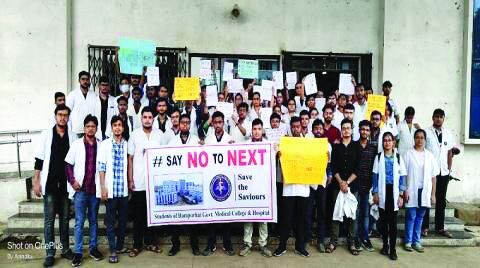High-stakes gamble of medical licensing tests

new delhi: The National Medical Commission’s (NMC) recent announcement regarding the National Exit Test (NExT) has stirred a significant debate within the medical community. Scheduled for May 2024, the NExT will serve as a licensing exam for medical students, allowing them to practice or pursue postgraduate courses. While the introduction of this MCQ-based exit exam aims to streamline the qualifications of MBBS graduates, concerns have been raised about its potential to undervalue the significance of practical and ward-based experience in shaping competent and well-rounded doctors.
Presently, practical experience gained through serving in wards is a crucial component of the MBBS course, serving as a prerequisite for appearing in MD exams. This hands-on training ensures that MBBS qualified doctors possess a minimum standard of competence before entering the field.
Medical professionals have voiced concerns that the current emphasis on tactically cracking exit exams without proper coaching undermines the ethical responsibility of doctors to society. It transforms medical degrees into mere tickets for obtaining returns on the investment made in coaching and exorbitant medical fees. The introduction of centralized multiple-choice entrance exams over the past decade has inadvertently facilitated the emergence of coaching cartels catering to the aspirations of those who can afford. Additionally, it has paved the way for the proliferation of private medical institutions, often established under the guise of ‘trusts,’ which now hold equal status to government institutes in common entrances.
Tragic incidents such as the suicides of Anitha and Pratibha, both medical aspirants from rural areas, non-English boards, and backward castes, highlight the deeply entrenched flaws within the system, signifying that only the privileged few gain access to the medical industry, perpetuating a system that excludes marginalized sections of society.
Critics argue that the establishment of the NMC in 2019 further curtailed the professional autonomy of doctors and centralized decision-making, as its members are solely nominated by the ruling Union government. This departs from the earlier practice of electing members from the medical fraternity to the Medical Council of India (MCI). The All India Democratic Students Organisation (AIDSO) has criticised the NExT for Rs 2,000 fee for just the mock test alone, continuing to remain inaccessible and expensive to many.
Despite Health minister Mansukh Mandaviya’s clarification that the NExT will be applicable to the 2020 MBBS batch, students from other batches remain displeased and skeptical. The introduction of negative marking in the licensing exam has sparked apprehension among students, as it may lead to a lower passing percentage. Students argue that the rules set by the NMC, which primarily consider the AIIMS curriculum, fail to acknowledge the varying faculty expertise, infrastructure, and differing completion times for syllabi among different colleges.
An aspiring MBBS student voiced his concern, stating, “No other screening exam or medical license exam imposes such immense stress. Coupled with unfavorable working conditions, limited job prospects, and inadequate well-being security, it is an enormous disappointment for medical students and the entire medical community. How much more stress must we endure?”



